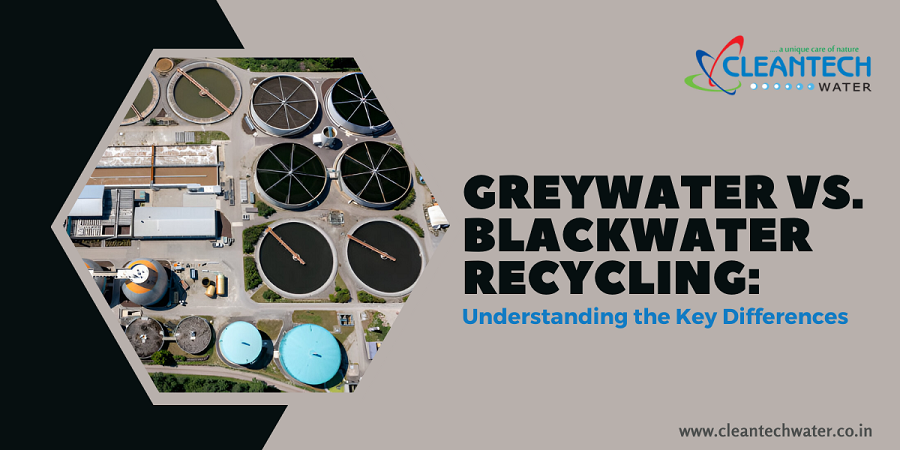Water scarcity is an increasing concern for businesses and property owners worldwide. As sustainable water management gains importance, greywater recycling has emerged as a practical solution to reduce water consumption and minimise waste. However, many still confuse greywater recycling with blackwater recycling. While both processes aim to reclaim and reuse water, they differ significantly in terms of sources, treatment complexity, and applications. Understanding these differences can help you make informed decisions about implementing the right wastewater management system.

What is Greywater Recycling?
Greywater recycling refers to the collection, treatment, and reuse of relatively clean wastewater from non-toilet plumbing systems. This includes water from showers, sinks, laundry machines, and bathtubs. Unlike blackwater, which contains human waste and requires extensive treatment, greywater has lower contamination levels, making it easier to recycle and reuse.
How is Greywater Treated and Reused?
Greywater treatment involves multiple stages to ensure it is clean and safe for reuse. The process typically includes:
- Preliminary Filtration – Large particles, hair, and debris are removed through mesh filters or sedimentation tanks to prevent clogging in the system.
- Biological Treatment – Beneficial bacteria break down organic matter, reducing contaminants and improving water quality.
- Advanced Filtration – Additional filtration using sand filters, activated carbon, or membrane systems further purifies the water by removing fine particles and dissolved impurities.
- Disinfection – The treated greywater undergoes disinfection using ultraviolet (UV) light, chlorine, or ozone to kill pathogens and harmful microorganisms.
- Storage and Distribution – The purified water is then stored in designated tanks and pumped to applications such as irrigation, toilet flushing, and cooling systems.
Once treated, greywater can be reused for various purposes, including irrigation, toilet flushing, and cooling systems in industrial facilities. By implementing a greywater recycling system, businesses and households can significantly reduce their reliance on freshwater sources.
Benefits of Greywater Recycling for Households and Industries
- Water Conservation – Reduces freshwater consumption by repurposing wastewater for non-potable uses
- Cost Savings – Low water bills and operational costs, especially for businesses with high water usage
- Environmental Sustainability – Decreases the burden on municipal water supplies and reduces wastewater discharge into the environment
- Energy Efficiency – Reduces the energy required to treat and transport fresh water, contributing to lower carbon footprints
What is Blackwater Recycling?
Blackwater recycling involves the treatment of wastewater that contains human waste and organic matter from toilets and sinks. Due to its high contamination levels, blackwater requires advanced treatment methods before it can be safely reused or discharged.
Treatment Process in a Wastewater Treatment Plant
Blackwater is typically processed in a wastewater treatment plant through multiple stages to ensure it is treated effectively and safely for reuse or discharge. The process involves:
- Primary Treatment – Large solids, grease, and sediments are separated from the wastewater through screening and sedimentation. This step removes debris and reduces the overall pollutant load before further processing.
- Secondary Treatment – Biological treatment methods, such as activated sludge processes or biofilm reactors, are used to break down organic matter. Beneficial microorganisms consume harmful contaminants, significantly improving water quality.
- Tertiary Treatment – Advanced filtration and chemical processes, including membrane filtration, carbon adsorption, and nutrient removal, help further refine the treated water to meet safety and environmental standards.
- Disinfection – The final step involves disinfecting the treated water using chlorine, ultraviolet (UV) light, or ozone to eliminate any remaining pathogens, ensuring it is safe for reuse or disposal.
- Reuse or Safe Discharge – Once treated, the water can be repurposed for non-potable applications such as irrigation, industrial cooling, or toilet flushing. If reuse is not an option, it is safely discharged into water bodies while meeting regulatory standards.
- Primary Treatment – Removal of solids and sediments through sedimentation and screening.
- Secondary Treatment – Use of biological processes to decompose organic matter and decrease contaminants.
- Tertiary Treatment – Advanced filtration, disinfection, and chemical treatment to ensure the water meets quality standards.
- Reuse or Discharge – Treated blackwater can be used for irrigation, industrial processes, or safely discharged into water bodies.
Challenges and Potential Uses of Treated Blackwater
- High Treatment Costs – Requires significant investment in infrastructure and maintenance.
- Strict Regulations – Must meet stringent water quality standards before reuse or discharge.
- Limited Reuse Applications – Treated blackwater is mainly used for irrigation, industrial cooling, and toilet flushing.
Understanding the differences between grey and blackwater recycling is crucial for businesses and property owners seeking efficient wastewater management solutions.
Book a Free Consultation for Custom Solutions!
The Role of Wastewater Treatment Plants
Modern wastewater treatment plants play a critical role in managing both grey and black water recycling. These facilities use advanced technologies to ensure that treated water meets regulatory standards and is safe for reuse.
Advanced Technologies Used for Efficient Recycling
- Membrane Bioreactors (MBR) – Combines biological treatment with membrane filtration to produce high-quality effluent.
- Reverse Osmosis (RO) – Removes dissolved salts and contaminants, making treated water suitable for industrial applications.
- Ultraviolet (UV) Disinfection – Uses UV light to kill bacteria and viruses without the need for chemicals.
- Anaerobic Digestion – Converts organic waste into biogas, reducing waste volume while generating renewable energy.
Benefits of Implementing Grey and Black Water Recycling Systems
- Water Conservation and Sustainability – By reusing wastewater, businesses and households can significantly reduce their dependence on freshwater sources. This helps preserve natural water reserves, ensuring a more sustainable future while addressing water scarcity issues in many regions.
- Cost Savings for Households and Businesses – Implementing grey and black water recycling systems lowers water utility bills by reducing the demand for fresh water. Industries and large commercial properties, which typically have high water consumption, can see significant cost reductions over time.
- Contribution to a Circular Economy – Recycling water aligns with the principles of a circular economy by repurposing wastewater instead of discarding it. This reduces environmental strain, minimises pollution, and supports sustainable business practices.
- Reduced Environmental Impact – Less wastewater discharge into natural bodies of water means reduced pollution and healthier ecosystems. Black and greywater recycling also helps lower the carbon footprint by decreasing energy consumption associated with water extraction, treatment, and distribution.
- Enhanced Water Security – As climate change and population growth put pressure on water resources, recycling wastewater ensures a more resilient and stable water supply for communities, industries, and municipalities.
- Compliance with Regulations – Many regions have stringent water conservation laws and incentives for businesses adopting sustainable practices. Investing in water recycling can help organisations meet environmental regulations and qualify for government incentives or certifications.
- Water Conservation and Sustainability – Reduces freshwater consumption and helps mitigate water shortages.
- Cost Savings for Households and Businesses – Lowers water utility bills and reduces wastewater treatment costs.
- Contribution to a Circular Economy – Promotes resource efficiency by reusing water instead of disposing of it.
Challenges and Considerations
While black and greywater recycling systems offer numerous benefits, businesses and property owners must consider several challenges:
1. Installation and Maintenance Costs
Setting up a water recycling system requires an initial investment in specialised infrastructure, such as filtration systems, storage tanks, and plumbing modifications. Additionally, ongoing maintenance is necessary to ensure efficiency, which may involve periodic inspections, filter replacements, and system upgrades.
2. Regulations and Compliance Requirements
Water recycling is subject to strict local, state, and federal regulations, which vary depending on the intended use of the treated water. Businesses must comply with guidelines related to water quality, health standards, and environmental impact assessments, which may require obtaining permits and undergoing routine inspections.
3. Public Perception and Acceptance
Despite advances in water recycling technology, public perception remains a significant barrier. Many individuals and businesses are hesitant to use treated wastewater, even for non-potable purposes, due to concerns about safety and hygiene. Effective education campaigns and transparency about treatment processes can help address these concerns and encourage wider adoption.
FAQs
Is greywater recycling suitable for all types of commercial properties?
Greywater recycling is beneficial for many businesses, including hotels, office buildings, and industrial facilities with high water usage. However, properties with limited greywater sources or space constraints may need customised solutions.
How does greywater recycling impact a property’s plumbing system?
Installing a greywater recycling system may require modifications to existing plumbing, such as separate drainage for grey and blackwater. Businesses should work with experts to ensure compliance with local plumbing codes and optimal system design.
What are the common maintenance requirements for a greywater recycling system?
Routine maintenance includes cleaning filters, checking pumps, and inspecting storage tanks for contamination. Regular system checks ensure efficiency and prevent issues like foul odours or bacterial buildup.
Are there any government incentives or rebates for businesses adopting greywater recycling?
Some regions offer tax credits, grants, or reduced water tariffs for businesses that implement water-saving technologies. Property owners should check with local authorities to learn more about these benefits.
Can greywater be used safely in food production facilities?
Greywater can be reused in food production facilities for purposes like landscape irrigation or cooling systems, but strict regulations often prohibit its use in direct food processing. Businesses must follow local health and safety guidelines.
Take the Next Step Toward Sustainable Water Management with Greywater Recycling
Water conservation is no longer an option—it’s a necessity. By implementing a greywater recycling system, your business or property can significantly reduce water consumption, lower utility costs, and contribute to a more sustainable future. Whether you operate a hotel, office building, or industrial facility, investing in greywater recycling ensures long-term benefits while supporting environmental responsibility.
Partner with Cleantech Water to invest in wastewater treatment solutions tailored to your needs. From installation to maintenance, we provide comprehensive solutions that meet regulatory standards and maximise efficiency.
Don’t let valuable water go to waste. Take control of your water usage today and join the growing number of businesses committed to sustainability. Contact us now for a consultation and discover how greywater recycling can transform your property into an eco-friendly, cost-saving powerhouse.
Start your journey toward water conservation—reach out to us today!

